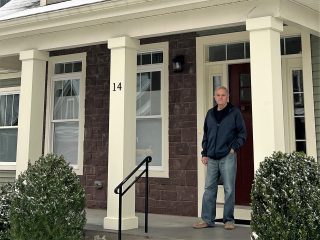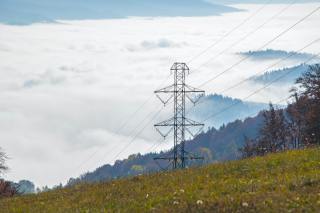
Kenneth McKinney took notice of the south-facing back roof before buying his Granby, Connecticut, home about two years ago. That roof, he thought, is ideal for solar panels.
So after he and his wife, Maribeth, moved into the new home in the Copper Brook Circle planned community, ideally located close to their son and his family, McKinney began researching solar installers. He invited a couple to provide him with proposals, and settled on a plan for a $30,000 installation.
“I figured out it would be a 7 ½-year payback,” said McKinney, 83, a competitive swimmer with a background in engineering.
He asked nearby neighbors if they had any objections to a view of panels on his back roof. Hearing none, last October he approached the executive board of the homeowner’s association.
And that’s where the project came to a halt. After seeking feedback from other homeowners in the 34-home community, the board told McKinney it was rejecting his request. In a December email to McKinney, board president Robert Picard said the board felt “that any decision relative to solar panels should not be rushed into and not considered until a specific and well thought out plan for Copper Brook is developed.”
Ultimately, Picard said, a solar panel policy “will be decided by a vote of the homeowners unless mandated by law.”
Sign up for Energy News Weekly
Get the most important energy news of the week delivered directly to your inbox.
But there is hope for McKinney’s plan yet. Because as it turns out, Connecticut does have such a mandate, though few people are aware of it.
“This is one of the best-kept secrets from the past legislative session,” said Mark Scully, president of People’s Action for Clean Energy, or PACE.
Buried in the 35-page Connecticut Clean Air Act, or Senate Bill 4, is a provision that prohibits common interest communities from adopting or enforcing rules that would prevent any unit owner from installing a solar generating system on their roof.
The law also includes so-called right-to-charge provisions, outlining the rights of condo owners and renters to install electric charging equipment in a garage or dedicated parking space.
Condominiums are exempt from the rooftop solar provision.
Previously, Connecticut was the only New England state without some sort of law restricting homeowners’ associations from banning rooftop solar.
Andrea Dunn, a lawyer and vice chair of the legislative advocacy committee for the state chapter of the Community Associations Institute, said the provision came up unexpectedly last session when it seemed lawmakers were “throwing everything into this Clean Air Act.”
She said her organization worked with former state Sen. Will Haskell on the provision’s wording.
“It’s been looming,” Dunn said. “The last five years this has been coming down the pike. I’ve been prepping my communities to keep it in mind because we’re going to have to be doing this.”
The provision allows associations to adopt rules governing the size and manner of installing rooftop solar, as well as the unit owner’s responsibilities for upkeep and maintenance. Associations are also allowed to establish prohibitions on any unit owner installing solar on shared common elements of the community.
Dunn says associations will have to address solar in much the same way they did satellite dishes years ago.
“They can’t really say no, but they can say where you can place [the dish]. When you leave, you have to take it off. If you damage the roof, you have to fix the roof,” she said. “I imagine solar is going to go the same route as that.”
Dunn said that while communities that are members of the Community Associations Institute likely know about the new law, those that aren’t connected very likely do not.
Tim Schneider, chief executive officer of Earthlight Technologies, a solar power company in Ellington, said that even he hadn’t heard about the solar law until his company was contacted recently by community associations in Simsbury and Portland who are exploring the option.
He said he’s disappointed that the provision excludes condominiums. But Dunn said that’s a more complicated area, since many condominium communities have shared roofs or are in converted factories.
As written, the law only impacts a small subset of households, probably under 1,000, according to Kim McClain, executive director of the state Community Associations Institute.
Picard, Copper Brook’s board president, did not immediately respond to a request for comment on how they plan to proceed with McKinney’s request.
But now that McKinney is aware of the law, he is eager to move forward. He’s followed up with his solar company — they were apparently unaware of the provision. And he plans to wait for a week or so to let the information “ferment” with the board “and see what floats to the top.”



